- Home
- T. A. Pratt
Dead Reign
Dead Reign Read online
For Greg,
who would make a ferocious zombie killer,
if it ever came to that
In their last sleep—the dead reign there alone.
So shalt thou rest, and what if thou withdraw
In silence from the living, and no friend
Take note of thy departure?
—William Cullen Bryant, “Thanatopsis”
1
M arla Mason sat in the branches of an ancient oak on a ridge, spying on the moonlit cemetery below. A tall elderly man with a walking stick stood near a freshly disturbed grave, supervising a pair of homeless ordinaries armed with shovels. A black goat chewed peacefully on the grass near the grave, tethered by a length of twine to the stone cross of a neighboring headstone.
“I can’t believe we’re sitting in a tree,” Rondeau said, shifting on the branch next to her, but remembering to whisper, at least. “I’m ruining my pants.”
“At least it’s summer. Be glad we’re not sitting in an ice-covered tree in winter. I told you we were doing a stakeout tonight. It’s not my fault you decided to wear a leisure suit.” She glanced at her morose colleague. “That shade of green doesn’t even blend in with the foliage. I’m not sure that shade of green even exists in nature.” She looked back down on the scene below. The tall man paced around the gradually emptying grave like an expectant 1950s father in a waiting room.
“Why do I have to be here again?” Rondeau said.
“Stakeouts are boring. You make them slightly less boring, what with your amusing complaints and comical discomfort.”
“Wonderful. Remind me to cultivate greater dullness. I don’t see why we need to spy on Ayres. We’re in the business of hassling crazy people now?”
“We’re not hassling Ayres. He doesn’t even know we’re here. We’re just going to enforce the terms of his parole. Unless you want hordes of zombies running around all over town?”
“Fast zombies or slow zombies?”
Marla scowled at him, but he didn’t take much notice. “What?”
“Well, the classic George Romero Night of the Living Dead zombies, shambling around slowly, there could be a certain pleasure in dealing with that, you know? Taking them out using shotguns and baseball bats, whack whack whack. Killing zombies is like killing Nazis. You don’t even have to feel bad about it. It’s like shooting rats at the dump. Very cathartic.”
“You’re a sick bastard, Rondeau.”
He shrugged. “Fast zombies, though, like you see in movies nowadays, those are scary.”
“Ayres makes real zombies.” She considered. “Well, not actually like Haitian Vodoun zombies, either, I guess. He animates corpses to do his bidding. Not like movie zombies anyway.”
“Oh, so the zombies aren’t even contagious? I mean, if they bite you, you don’t rise from the dead with a craving for brains? Hell. Those would be easy.”
“Under the terms of his release, Ayres isn’t supposed to practice necromancy. I insisted on that. And unless he’s gotten into garden-variety grave-robbing, he’s about to break his agreement.”
“Why the restrictions, though? Dr. Husch said Ayres is cured. He’s trying to become a contributing member of our little underground society again. I think you just have an irrational hatred for necromancers, ever since that guy Upchurch raised Somerset from the dead and you got your ass kicked.”
Marla punched Rondeau in the arm, making him grab wildly for a branch to keep from tumbling out of the tree. “My ass was only kicked provisionally. I beat Somerset in the end. No, I’ve got personal reasons to want Ayres out of the picture.”
“Why don’t you ever tell me anything?”
“Sorcerers have secrets like surgeons have scalpels, Rondeau. Tools of the trade.”
Marla didn’t look at him, but she could sense Rondeau rolling his eyes. “Okay, whatever. So what’s the goat for?”
“Sacrifice. Necromancy runs on blood. To make the dead speak, a few drops of the sorcerer’s own blood will suffice. To raise a fresh human corpse, you don’t need much blood—just a rat or a pigeon. To raise older corpses or get a skeleton walking around, you need more blood, bigger sacrifices.”
“That looks like a fresh grave they’re digging up, so why’s he going to kill that cute goat instead of a rat?”
Marla shrugged. “He’s an old man, and it’s easier to buy a goat than catch a rat? Or maybe it’s because he’s been out of practice for fifteen years? I don’t know. I’m not a necromancer. Smelly, ugly business.”
The men at the pit hauled the casket up out of the hole with ropes. Ayres paid them, and they left, brushing grave-dirt off their already filthy clothes. The necromancer watched them depart, then opened a satchel and drew out various jars and candles. The goat watched him with interest. Marla let him pour out a few lines of sand and powder on the grass, getting well into his ritual, before saying, “Okay, let’s go break up this shindig.”
She dropped out of the tree, her black cloak flapping behind her. She’d permanently retired her signature magical purple-and-white cloak—she preferred using magic that didn’t actually drive her insane, and this new cloak was purely decorative. It had silver trim and everything. Still, style counted for something, and at this point most of the denizens of Felport’s magical underworld had a visceral reaction to the sight of Marla Mason wearing a cloak—pretty much the way a field mouse reacts to the shadow of a hawk on the ground.
Rondeau came down after her, rather less gracefully, but he managed a lazy saunter by the time they were halfway down the hill. “Hey, Ayres!” Marla shouted. “You’ve been a bad boy!”
“Miss Mason,” Ayres said, his voice about as sepulchral as could be expected. He rose from his preparations and hobbled toward her—was he making a bigger show of being frail now that he knew she was watching? “I…am surprised to see you here. I would not think my actions would interest you.”
“Rondeau, go untie the goat, take him back to the car, would you?”
“You’re going to put a goat in the Bentley? I think the owner’s manual advises against transporting livestock. It’s bad for the leather.”
Marla shooed him, and Rondeau complied, untying the goat and leading it away. The nibbles it was taking out of his pants would annoy him, once he noticed.
Marla turned to Ayres. “Of course I take an interest. You were clapped up in the nuthouse until a few days ago. Your release had one condition—don’t mess around with dead bodies—and here you are, up to your armpits in dead people. Metaphorically. I can’t have a rogue necromancer with mental health issues running around my city raising the dead unsupervised. It’s bad for business. And morale. And tourism. And hygiene.” She sat on the headstone, after glancing at the inscription to make sure it wasn’t anyone she knew. Ayres had probably just picked the freshest-looking grave.
Ayres lowered himself carefully down to sit on the unopened casket. “I require a servant.” He was unapologetic. “I’m an old man, and I need assistance.”
“You can’t raise the dead in Felport, Ayres. If you leave the city, you’re out of my jurisdiction, and you can do whatever you want. Go down to Mexico—there’s lots of call for necromancy down there, I hear. Or fly up to Detroit. That lunatic Nain Rouge who runs the place could always use another corpse-grinder. But you can’t do it here.”
“This is my home. I helped make this city great. When Somerset ruled, during World War II and afterward, Felport was a colossus. What have you done?” He sneered. “Under Sauvage’s reign, under yours, we’ve lost industry, the bridges are rusting, the bay is polluted, shipping has fallen off—”
“That’s not us, that’s just the economy.” She scowled. “Sauvage and I held disintegration at bay, damn it. Factories are leaving this country in droves, but we’ve tur
ned Adler College into a world-class institution of higher education, we’re cleaning up the parks, we’re bringing in biotech companies and research firms and—” She stopped. “Why am I justifying myself to you?”
“When the factories ran, when the smokestacks darkened the sky, when metal was forged and things were made here, Felport was a place of power, and Somerset tapped into it, he grew strong as the city did. What power can you draw from research, from ordinaries studying their incomplete histories in ivory towers? Bah.”
“We do all right. It’s a different world now, Ayres.”
Ayres started to rise, then made a visible effort to remain calm, sinking back down. “I beg you to reconsider. I served the previous two administrations, and I could serve yours. I understand you have no necromancers of note in the city now, merely half-trained ronin, men who should be apprentices but lack masters to teach them.”
“The city coroner, Dr. Matte, can coax a murdered corpse into telling us who killed him, and that’s about all the need we have for necromancers these days.”
Ayres leaned forward, his professional pride clearly wounded. “Those who communicate with the dead have far more uses than solving the petty crimes that afflict ordinaries.” His voice had the reflexive contempt many old-line sorcerers exhibited when talking about mundane citizens, the great mass of people going about their lives unaware of the magical men and women and things in their midst. She didn’t appreciate the attitude. Ninety-nine point nine percent of Felport’s populace consisted of just such ordinaries, and Marla was sworn to protect the whole city, not just the sorcerers who lived there. Besides, she’d been an ordinary herself once, before being initiated into the mysteries. It was an argument she’d had many times with Felport’s other sorcerers, who variously saw ordinaries as obstacles, experimental subjects, means to make money, or nuisances.
“Like what?” she said. “The last powerful necromancer we had in town, Upchurch, brought back the most horrible tyrant in Felport’s history. He raised Somerset from the dead, and Somerset killed him for his trouble, before going on a crime spree and trying to take over the city. You know how hard it is to kill an undead sorcerer?” She shuddered. She’d developed a gut-deep hatred of the living dead in all their incarnations during that nightmare.
Ayres shifted under her gaze. “I knew Upchurch. He was my apprentice, and when I…became ill…he took over my position as Sauvage’s advisor. He chose to resurrect Somerset for his own reasons, I’m sure. But think of it, Marla. I can call the shades of the city’s great past leaders to consult with you. I can shield you from death, and call you back to life if you should die. If the city is ever threatened, I can raise an army of undying warriors to fight by your side. I can communicate with inhabitants of nether dimensions, and they have resources we can scarcely comprehend. I can be of use to you, Marla.”
She took her dagger of office from the sheath at her belt and held it up to the moonlight, watching the reflection of light on metal. The dagger had a shining blade eight inches long, with a handle wrapped in alternating bands of white and purple electrical tape. The dagger never needed sharpening—it was magical, passed from chief sorcerer to chief sorcerer over the decades, and could cut through anything, material or ethereal. The sight of Marla holding the dagger tended to unnerve people. “Nobody’s doubting your qualifications. But you’ve been locked up for fifteen years. You just got out of a hospital for the criminally insane. It doesn’t look good on a résumé.”
“I am fully cured. Dr. Husch can vouch for my—”
“Ayres, you thought you were dead!” Dr. Husch had told her the condition was called the Cotard delusion. Those who suffered from the syndrome genuinely believed they were dead. Sometimes they thought they were being tormented in the afterlife, or believed they were wandering the world as ghosts, or thought they were zombies. Fifteen years ago Ayres had begun his constant complaints about the stench of rot, but at first, people thought it was just a side effect of his business—it was too late when they realized he thought his own flesh was rotting.
“That was then. I now know I am very much alive.” He tapped his walking stick on the grass, but that was his only sign of agitation. “Dr. Husch’s therapies were most effective.”
“You thought you were in Hell. You killed three innocent people because you thought they were demons!”
He bowed his head. “I know my crimes. I regret them deeply. I have paid for them. You cannot imagine the suffering I endured, Miss Mason. Aware of my own putrescence, smelling my own rot. Convinced I was dead and trapped in a Hell that simulated the streets of my beloved city, tormented by monsters who wore the faces of my friends, beasts with false smiles. Trying to play along with the charade of life, lest I be sent to some even more horrible and explicit Hell. That is penance, Miss Mason.”
“Yeah, well, screw all that,” she said, twirling the knife. “The real reason I won’t give you a job is because you betrayed my city by raising Somerset from the dead.”
He flinched. “I was imprisoned at the Blackwing Institute when that happened. I only heard about it secondhand. Upchurch was responsible—”
“Upchurch was a hack. He wore a top hat, and white greasepaint to make his face look like a skull. When somebody tries that hard, you know they don’t really have the chops. He was your apprentice. You told him to raise Somerset.”
“You have no proof of these allegations.”
She shrugged. “You were in low security back then, because Dr. Husch had decided you weren’t a threat to others. You were allowed to walk the grounds at Blackwing, with supervision. You were allowed to have visitors. I know Upchurch visited you several times in the weeks before Somerset was resurrected—I checked the logs. I don’t know what you talked about, but I can guess. Somerset killed Sauvage. That guy was my friend.” Sauvage was her predecessor as chief sorcerer, and they’d gotten close back when she was a freelancer living by her wits and her steel-toed boots. “If I hadn’t stopped him, Felport would be a little piece of Hell on Earth now.”
“Somerset was a great leader. Strong. Sometimes ruthless, it’s true. I served him until he died, and then I served Sauvage, who was barely half the man Somerset was. He had no vision. But still, I worked for him loyally.”
“Until he had you locked up, right, Ayres? That must have pissed you off. Somerset wouldn’t have put you away—he didn’t care if the occasional ordinary got killed in the course of business. They were never part of his vision.”
Ayres took a deep breath. “As I said, you have no proof. Your accusations are baseless.”
Marla looked him over. He was old, yes, but far from broken. She’d hoped he would confess, but really, did it matter? “True. Upchurch was torn to bits by Somerset, and Dr. Matte couldn’t put his skull back together well enough to make him speak after death. So yeah, all I’ve got is suspicions. But they’re strong suspicions. If I had proof, you’d be dead by now. Dead for real.”
“I could have brought Upchurch’s shade back to answer questions,” Ayres said, a trifle smugly. “You see? You could use someone of my talents.”
Marla snorted. “I’ll pass. Get out of here, old man.”
He blinked at her. “What?”
“Beat it. Get lost. This is your one warning. If I catch you trying to practice your craft in my city again, I won’t have you committed—I’ll just strip you of your property and banish you.”
“I’ve done nothing wrong. I deserve—”
“You deserve whatever I want to offer.” Her voice was low and dangerous. “I don’t even need reasons. I’m in charge, and you’re out. If you want to retire and spend your days yelling at the kids on your lawn and playing Bingo, great, you’re welcome to stay, and I won’t say boo to you. But your time as a sorcerer is over. I won’t have you bringing any more dead monsters from the past to life.”
Ayres slumped his shoulders, and the light left his eyes. “I cannot change your mind?”
“Please. You’re lucky I gave y
ou one screwup for free.”
“I will be on my way, then.” He started to gather his candles and powders.
“Leave that stuff. Consider it a donation to the city.”
Ayres didn’t even object, just nodded and walked away, leaning heavily on his stick as he went.
Marla opened her cell phone and called her consiglieri, Hamil. “Can you send a couple of guys with shovels down to the Browne Memorial Cemetery? I’ve got a coffin that needs burying. Or rather, reburying.”
“I don’t even want to know, do I?”
“Probably not.” Marla didn’t tell him about her suspicions regarding Ayres. She couldn’t prove anything, after all. “Nothing to worry about.”
“You’re still going to see the Chamberlain tomorrow about the Founders’ Ball?” Hamil said.
“Yeah, yeah, you’ve reminded me a thousand times.” Marla hung up.
She should get back to the car. Rondeau could get into all kinds of mischief by himself, and she shuddered to think what he might accomplish with the help of a small goat. But being in a cemetery made her melancholy, and she wanted to shake that off before she rejoined the company of others. Marla wasn’t far from the grave of her friend Ted, who’d died last winter, and she walked toward his modest marker. She also wasn’t far from the grave of her onetime lover Joshua Kindler, the man who’d killed Ted, and the last person to die at Marla’s hands. Marla wasn’t comfortable with killing people—from a purely pragmatic standpoint, murder incurred a deep karmic debt, and could eventually have dangerous consequences for a user of magic. As she looked down at Ted’s dark gravestone, set flush with the ground and inscribed with only his name and dates, she thought about other graves she’d filled. Three here in Felport. Two in San Francisco, though one was just an unmarked hole in Golden Gate Park. One back in her hometown in Indiana. Too many deaths. Most were situations where she’d had no other options, but some of them…some of them could have been different, if she’d been brave enough or smart enough or, though she hated to admit it, a little less sure of her own righteousness.

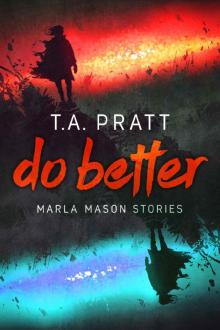 Do Better: Marla Mason Stories
Do Better: Marla Mason Stories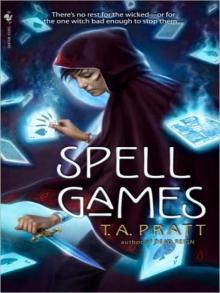 Spell Games
Spell Games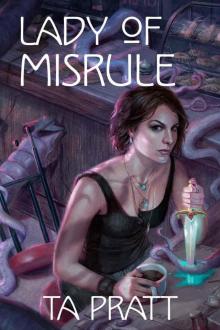 Lady of Misrule (Marla Mason Book 8)
Lady of Misrule (Marla Mason Book 8)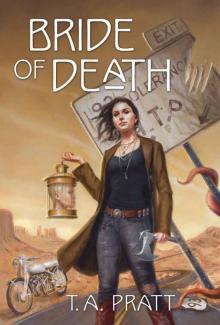 Bride of Death (Marla Mason)
Bride of Death (Marla Mason)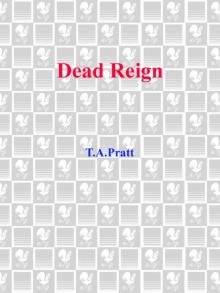 Dead Reign
Dead Reign Blood Engines
Blood Engines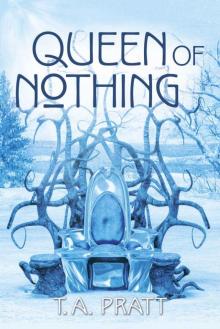 Queen of Nothing (Marla Mason Book 9)
Queen of Nothing (Marla Mason Book 9)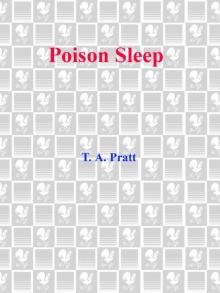 Poison Sleep
Poison Sleep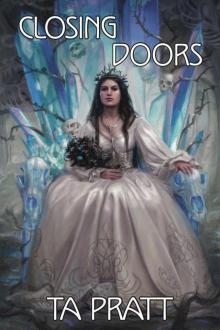 Closing Doors: The Last Marla Mason Novel
Closing Doors: The Last Marla Mason Novel